Universities in South Africa
南アフリカの大学について
Many of South Africa's universities are world-class academic institutions at the cutting edge of research in various spheres. Together, the country's 26 public higher education institutions offer a range of study and research options for both local and international students.
There are three types of universities:
- Traditional Universities (11): Rhodes University; North-West University; University of Cape Town; University of Fort Hare; University of the Free State; University of KwaZulu-Natal; University of Limpopo; University of Pretoria; University of Stellenbosch; University of the Western Cape; and University of the Witwatersrand
- Comprehensive Universities (6): University of Johannesburg; Nelson Mandela Metropolitan University; University of South Africa; University of Venda; University of Zululand; and Walter Sisulu University
- Universities of Technology (6): Cape Peninsula University of Technology; Central University of Technology; Durban University of Technology; Mangosuthu University of Technology; Tshwane University of Technology; and Vaal University of Technology
- New University (3): University of Mpumalanga; Sol Plaatje University; and Sefako Makgatho Health Sciences University
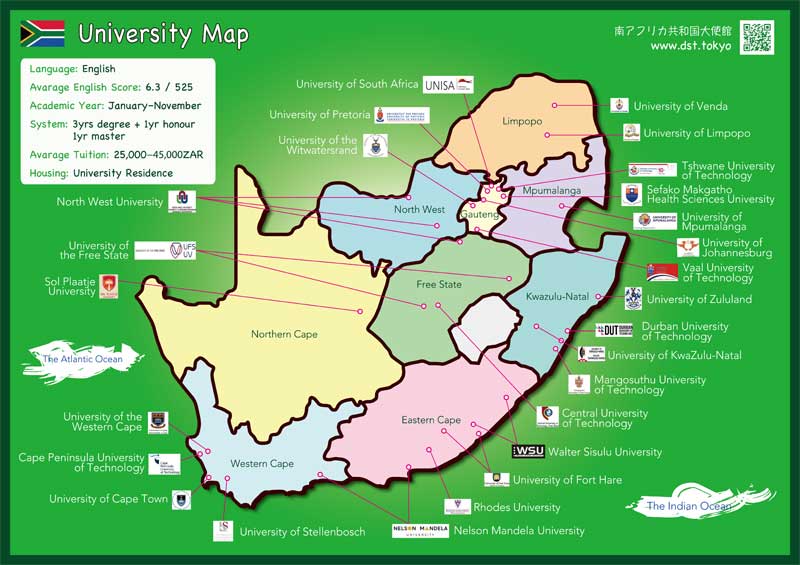
(click to) map of universities in South Africa
Featured Articles
South Africa: Living Laboratory, from the JASSO's web magazine
日本学生支援機構のウェブマガジン「留学交流」2018年1月号 Vol.82 に 南アフリカへの専門留学 の記事が掲載されました。
Top 10 Universities in South Africa 2016 (QS University Rankings: BRICS)
First launched in 2013, the QS University Rankings: BRICS showcases the best performing universities in the five BRICS countries (Brazil, Russia, India, China and South Africa). A total of 11 top universities in South Africa are included in the ranking this year. read more...
South African Research Chairs Initiative
The South African Research Chairs Initiative (SARChI) The South African Research Chairs Initiative (SARChI) was established in 2006 by the Department of Science and Technology and the National Research Foundation. It is designed to attract and retain excellence in research and innovation at South African public universities through the establishment of Research Chairs at public universities in South Africa with a long-term investment trajectory of up to fifteen years. read more...South Africa's 大学 Times
You can download the 2012, 2013 and 2014 editions of the Embassy Newsletters on South African universities.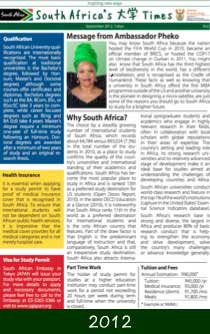
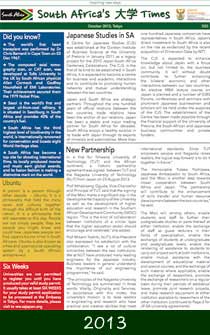
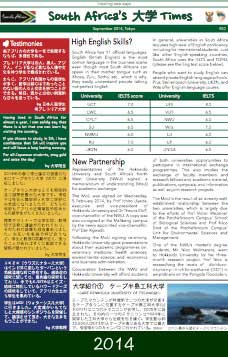
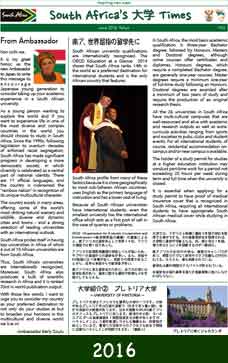
Research Experience in SA
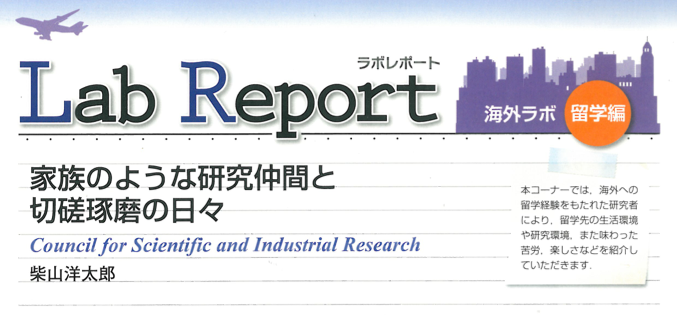
1. Traditional Universities
1.1 Rhodes University
Based in the Eastern Cape town of Grahamstown, Rhodes University is more than a century old. The university has around 6 000 students, of which a quarter are international students from 57 different countries. Nearly half the student body live on campus, in residences.
Rhodes offers a range of undergraduate and postgraduate degrees in the faculties of humanities, science, commerce, pharmacy, law, and education. It boasts the highest academic staff to student ratio of any university in South Africa and is perhaps best known for its journalism and media studies department.
1.2 North-West University
North-West University was formed in 2004, with the merger of the Potchefstroom University for Christian Higher Education and the University of North-West, formerly the University of Bophuthatswana. It is now one of South Africa's biggest universities, with about 32 000 fulltime and distance students.
It has three campuses in two provinces: the Mafikeng and Potchestroom campuses are in the North West province, while the Vaal Triangle campus is in Gauteng. It upholds the promotion of multilingualism as a core practice, with key innovations in place to meet the needs of its diverse student body.
1.3 University of Cape Town
South Africa's oldest university, founded in 1829, UCT has one of the most picturesque campuses in the world, situated on the slopes of Table Mountain’s Devil’s Peak and overlooking Rondebosch in Cape Town. The university is regarded as the top research institution on the continent, with more "A" rated researchers than any other South African university. It is the highest ranked African university in both the QS World and the Times Higher Education world university rankings.
The university is home to Groote Schuur Hospital, where the world's first heart transplant took place in 1967, and lists five Nobel Laureates among its alumni.
1.4 University of Fort Hare
The University of Fort Hare, dating back to 1916, is the oldest historically black university in the country. It was the academic home of many of South Africa's most prominent leaders, including Nelson Mandela, Oliver Tambo, Govan Mbeki, and Mangosuthu Buthelezi.
Fort Hare has two Eastern Cape campuses, in Alice and East London. It offers a range of degrees and diplomas in faculties of science and agriculture, social sciences and humanities, management and commerce, and at the Nelson R Mandela School of Law.
1.5 University of the Free State
The University of the Free State, which was established in 1904, has its main campus as well as a second smaller campus in Bloemfontein. Its third campus is in Qwaqwa, in the Eastern Free State.
With around 33 000 students, the university offers a full range of under- and post- graduate degrees and diplomas in the faculties of education, health sciences, including a medical school, the humanities, law, natural and agricultural sciences, theology, as well as economic and management sciences, which also houses the UFS business school. All classes are offered in Afrikaans and English.
Under the leadership of Professor Jonathan Jansen, the university is committed to its vision of becoming an equitable multicultural and multilingual university.
1.6 University of KwaZulu-Natal
Incorporating the former Durban-Westville and Natal universities, the university covers four campuses in Durban and one in Pietermaritzburg. With around 42 000 students, it comprises four colleges: agriculture, engineering and science; health sciences, including schools of clinical medicine and nursing; humanities; and the college of law and management studies.
1.7 University of Limpopo
The University of Limpopo has two main campuses: one at Turfloop, to the east of Polokwane in Limpopo province; the other at Ga-Rankuwa, just north of Pretoria. The university represents a merger between the University of the North and the Medical University of Southern Africa (Medunsa), which was incorporated as a full medical faculty.
Its other faculties are humanities; science and agriculture; and management and law. The university focus is on finding solutions to meet the needs of African rural communities.
1.8 University of Pretoria
Established in 1930, the university is one of South Africa's largest, offering around 1 800 academic programmes in English and Afrikaans. It has the highest research output in South Africa, a position it has held proudly since 1997.
The university has nine faculties spread over seven campuses – economic and business sciences; education; engineering; built environment and information technology; health sciences; humanities; law; natural and agricultural sciences; theology; and a faculty of veterinary science at Onderstepoort, which is the only one of its kind in South Africa.
Its business school, the Gordon Institute of Business Science, was established in Johannesburg in 2000. GIBS was ranked as the top MBA in Africa by the Financial Times in 2011.
1.9 University of Stellenbosch
Situated in the wine-growing region of Stellenbosch, 60km from Cape Town, Stellenbosch University has four campuses: the main campus at Stellenbosch, which hosts the faculties of arts and social sciences, science, education, agrisciences, law, theology, economic and managements sciences, and engineering. The health sciences faculty is at Tygerberg Hospital, while the business school is in Bellville, and military sciences faculty in Saldanha.
The university, home to around 26 000 students, is committed to using and sustaining Afrikaans as an academic language in a multilingual context. So while predominantly Afrikaans, many courses are lectured bilingually, and students are allowed to write their assignments and exams in English. At postgraduate level, the language of tuition is determined by the composition of the class. www.sun.ac.za
1.10 University of the Western Cape
Originally established in 1959 as an ethnic college for coloured students, the university now provides facilities for more than 12 000 students across 68 departments and 16 institutes, schools and research centres.
Based in Tygerberg, just north of Cape Town, the university has faculties of arts, community and health sciences, dentistry, economic and management sciences, education, law, and natural sciences. UWC is dedicated to the research and development of free and open-source software. It is the only African member of the Open Courseware Consortium.
1.11 University of the Witwatersrand
Based in Johannesburg, Wits University is one of the country's leading research institutions, attracting students from across Africa. Wits has produced more than 120 000 graduates across a range of disciplines since being granted full university status in 1922.
The university, with about 28 000 students, offers degrees in the faculties of engineering and the built environment; science; the humanities; health sciences; as well as commerce, law and management. The highly regarded Wits Business School is one of the oldest in South Africa.
Wits is also home to one of the largest fossil collections in the southern hemisphere and its Institute for Human Evolution is dedicated to palaeoanthropological research.
2. Comprehensive Universities
2.1 University of Johannesburg
Established in 2005, the University of Johannesburg incorporates the former Rand Afrikaans University, Technikon Witwatersrand, and Vista University's Johannesburg campuses. It offers both technical and academic programmes to around 50 000 students.
There nine faculties spread over five different campuses: art, design and architecture; economic and financial sciences; education; engineering and the built environment; health sciences; humanities; law; management; and science.
2.2 Nelson Mandela University
The university, with its 25 000 students, has five campuses in Port Elizabeth in the Eastern Cape and one in George in the Southern Cape. It incorporates the former PE Technikon, University of Port Elizabeth, and Vista University's Port Elizabeth campus.
As a comprehensive university, it offers vocational and professional training across the faculties of arts; business and economic sciences; education; engineering, the built environment and information technology; health sciences; law; and science.
2.3 University of South Africa
Unisa is one of the largest open distance-learning institutions in the world and has more than 300 000 students in 130 countries. Its roots stretching back more than 130 years, a “new Unisa” was formed in 2004 when it merged with Technikon SA and Vista University's distance education division. Based in Pretoria, but with regional offices in all nine provinces, it offers distance education programmes – both academic and technical.
2.4 University of Venda
Established in 1982, the University of Venda for Science and Technology is in Thohoyandou in Limpopo. It offers academic, professional and career-focused programmes in the fields of education; environmental sciences; agriculture; health sciences; human and social sciences; law; management sciences; as well as mathematical and natural sciences.
2.5 University of Zululand
The University of Zululand is a rural-based comprehensive university, with its main campus in Kwadlangezwa, just south of Empangeni, a second campus in Richards Bay, as well as other off-campus centres. With just under 9 000 students, it offers career- focused programmes and courses that have been structured with potential employees and employers in mind. It has four faculties: arts; commerce, administration and law; education; and science and agriculture.
2.6 Walter Sisulu University
Billing itself as a “developmental university”, Walter Sisulu University’s location in the Eastern Cape presents it with unique challenges and opportunities. Since its 2005 merger with the former Border and Eastern Cape technikons and the University of the Transkei, the university has around 20 000 students spread across its campuses in East London, Butterworth, Queenstown and Mthatha.
It offers a range of degrees, certificates and diplomas in four faculties (science, engineering and technology; health sciences; business, management sciences and law; education). It hosts an MBChB programme in Mthatha.
3. Universities of Technology
3.1 Cape Peninsula University of Technology
Incorporating the former Cape and Peninsula technikons, the university is the largest in the Western Cape, with more than 32 000 students on four campuses in and around Cape Town and a fifth in Wellington. CPUT emphasises in-service training, which often comes in the form of a six-month internship.
3.2 Central University of Technology
Incorporating the former Technikon Free State and Vista University's Welkom campus, the university is based in Bloemfontein. It has a regional learning centres in Welkom and Kimberly in the Northern Cape. Almost 50 programmes are offered in three faculties: management sciences; engineering, information and communication technology; and health and environmental sciences.
3.3 Durban University of Technology
Incorporating the former ML Sultan and Natal technikons, the university has major campuses in Durban and Pietermaritzburg as well as satellite campuses in Umlazi. As a university of technology, DUT focuses on applied research as well as on technological innovation.
It operates on five different campuses in Durban, and two in Pietermaritzburg, offering tuition through its six faculties of accounting and informatics; applied sciences; arts and design; engineering and the built environment; health sciences; and management sciences. It also has a Business Studies Unit.
3.4 Mangosuthu University of Technology
Mangosuthu University of Technology was established as a technikon in 1979 by Mangosuthu Buthelezi, then the chief minister of KwaZulu, a “homeland” created under apartheid. It is based in Umlazi, 25km from Durban. Now a university of technology, it has 10 000 students studying in three different faculties: management sciences, engineering, and natural sciences.
3.5 Tshwane University of Technology
Incorporating the former Northern Gauteng, North West and Pretoria technikons, Tshwane University of Technology offers masters and doctoral programmes in addition to degrees, certificates and diplomas. It has campuses in four of South Africa’s northern provinces and annual student enrolment is around 60 000 students. There are seven faculties: engineering and the built environment; science; humanities; management sciences; information and communication technology; arts; as well as economics and finance.
3.6 Vaal University of Technology
The university has around 21 000 students spread across its main campus in Vanderbijlpark, 60km south-west of Johannesburg, and four satellite campuses, which include the Sebokeng campus of the former Vista University. It has four faculties: engineering and technology; applied and computer science; human sciences; and management sciences.
4. New Universities
4.1 University of Mpumalanga
In July 2013, the State President, Honourable Mr J G Zuma, announced the name of the new university as the "University of Mpumalanga". The University of Mpumalanga, a comprehensive university, was formally and legally promulgated through the publication of Government Notice (No. 36772) on 22 August 2013 and launched on the 31st of October 2013.The inaugural students were enrolled in February 2014 in the following programmes:
- Bachelor of Education (Foundation Phase Teaching);
- Diploma in Hospitality Management;
- Bachelor of Agriculture (Agricultural Extension).
- Diploma in Agriculture (Plant Production); and
- Diploma in Information Communication Technology (Application Development).
4.2 Sol Plaatje University
The Sol Plaatje University, which had provisionally been referred to as the University of the Northern Cape, opened in Kimberley, South Africa, in 2014, accommodating a modest initial intake of 135 students. The student complement is expected to increase gradually towards a target of 7,500 students by 2024. Launched in a ceremony in Kimberley on 19 September 2013, it had been formally established as a public university in terms of Section 20 of the Higher Education Act of 1997, by way of Government Notice 630, dated 22 August 2013. Minister of Higher Education and Training, Blade Nzimande, observed at the launch that this "is the first new university in South Africa to be launched since 1994 and as such is a powerful symbol of the country's democracy, inclusiveness, and growth. It represents a new order of African intellect, with a firm focus on innovation and excellence." Previously announcing the name for the university, on 25 July 2013, President Jacob Zuma mentioned the development of academic niche areas that did not exist elsewhere, or were under-represented, in South Africa. "Given the rich heritage of Kimberley and the Northern Cape in general," Zuma said, "it is envisaged that Sol Plaatje will specialise in heritage studies, including interconnected academic fields such as museum management, archaeology, indigenous languages, and restoration architecture."
4.3 Sefako Makgatho Health Sciences University
The Minister of Higher Education and Training, Dr Blade Nzimande has established a new institution, i.e., the Sefako Makgatho Health Sciences University (SMU) whose main purpose is teaching, research and community engagement. This was published in the South African Government Gazette no: 37658 of the 16 May 2014. The University is located at Ga-Rankuwa at the then Medunsa campus of the University of Limpopo, previously known as the Medical University of Southern Africa (MEDUNSA).The University opened its doors in January 2015 and continues with the academic programmes offered at the then Medunsa campus.
